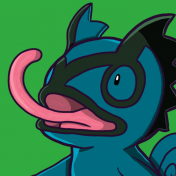Oh boy... Time to stay impartial.
Pokémon GO is an Augmented Reality, location based game. It released on mobile devices as a free-to-play game back in 2016. It's developed by Niantic as well as The Pokémon Company. Using geographic location technology, players must physically travel around outside in order to find and catch Pokémon.
But before I get deep into the actual game, it's worth looking at a couple of things that influenced this.
Before making Pokémon GO, Niantic made a game called Ingress back in 2013, the concept was pretty similar. You had to travel around outside to find portals to collect items and stuff like that. It did pretty well at the time, at one point, reaching over 8 million downloads. It's even been the subject of some academic studies. No, I'm not getting into that.
During 2014's April Fools' Day, The Pokémon Company collaborated with Google (Who owned Niantic at the time) to develop the "Google Maps Pokémon Challenge" 151 Pokémon from the first 6 generations were placed in various locations on the Google Maps globe and players had to find them by looking around the map. It was received pretty well and was a fun little diversion.
Niantic used the crowd sourced data from Ingress as well as data from Google Maps to help develop Pokémon GO. Anyway, now I'm gonna try and explain how the game works, which might actually be the most pointless thing I've done in this thread because I can guarantee almost all of you already know more about it than I do. But indulge me.
As I mentioned before, the main task is to catch Pokémon. To do this, you must travel to various locations in real-life. Once you get close enough to a Pokémon, touching it will take you into a separate screen where you can attempt to catch it.
Call me nerdy, but I doubt Treeckos would be found near bins.
Here, you flick the Poké Ball towards the Pokémon to attempt to catch it. You can use certain items to try and increase the chances of capture, but take too long and the Pokémon might just leg it. This style of capturing would be later implemented in the mainline series in the recently released "Let's GO" games.
When you capture a Pokémon, you get experience points that can increase your Trainer Level, doing this gets you items as well as making it easier to find Pokémon with higher CP (CP is a measurement of how strong a Pokémon is). Just like the mainline games, you can evolve Pokémon, but because Pokémon don't have individual levels, you evolve most Pokémon by feeding them candy that matches their evolution line. The most efficient way of getting candy is to catch a large amount of the same Pokémon.
To get items such as Poké Balls, you'll need to travel to various landmarks in the real world that have been designated as Pokéstops. Flicking their icon to spin it around will net you items as well as other bonuses. You can also buy items with real-life money through microtransactions.
Over the lifespan of the game, Pokémon GO has received a number of updates that have added Pokémon other than the first 151 from Generations 2-4 (Not Kecleon though for some reason), various features such as trading with nearby friends, a very simplified battle system, various missions to complete for bonuses, a gifting mechanic and other stuff. The game still gets updates to this day and I'm not going to go into too much detail on all the features because I'll be here forever otherwise.
A few months after Pokémon GO was released, Nintendo developed an accompanying device called the Pokémon GO Plus. It's a bluetooth device that lets players catch Pokémon and spin Pokéstops without opening Pokémon GO on their mobiles.
You don't need me to tell you that Pokémon GO immediately became a global phenomenon Everyone who wasn't me was playing this game to an absurd degree. The Pokémon series hadn't seen a massive spike in popularity like this since the initial Game Boy titles. It broke an obscene amount of records as far as mobile applications go. It's been confirmed to have been downloaded over 800 million times to date. This game was everywhere and there was no avoiding it. Here's just some of the things that have happened as a result of the huge success of this.
People have helped authorities to arrest criminals because they happened to be a witness to a crime because they were playing GO.
Businesses have directly benefited from being near Pokéstops or becoming one themselves.
At one point, search service Yelp added a filter that only shows businesses that have a Pokéstop nearby.
The theme tune from the first series of the Pokémon anime saw a humongous spike in listeners on Spotify, despite the song not showing up anywhere in the actual game.
A few TV shows even started to reference the game, such as The Simpsons and Doctor Who, as well as in the music video of a Maroon 5 song.
Adult video streaming website, Pornhub, reported a 136% increase of Pokémon related searches within 5 days of the game getting released.
Don't say I don't do my research... Of course, with a hugely popular game like GO and some people being literally the worst when it comes to gaming, it was only a matter of time before controversy would raise it's ugly head. And this had some biggies.
That's not the only sign telling people to show some bloody decency!
As pictured above, there were more than a few places that weren't particularly thrilled with being designated a Pokéstop.
Dutch company ProRail filed complaints of people trespassing on their railway tracks trying to catch Pokémon.
In a similar vein, multiple Fire Stations were impeded by GO players congregating outside stations and blocking access points.
The Sydney suburb of Rhodes was a particularly notable incident where residents were constantly subjected to a big amount of players gathering in the area because it had a larger amount of Pokéstops than usual. This led to some seriously dangerous traffic congestion, noise complaints and a big increase in littering. The residents got so fed up with it, that they started throwing water bombs at people playing GO. Niantic eventually removed 3 Pokéstops from the area to reduce the amount of players travelling there.
Bosnian players had to be warned to not enter minefields that were left over from the Bosnian War. Yes, really.
Unfortunately, there have been many accidents caused by people not paying attention while playing the game. Including falling from high places, driving collisions caused by people playing while driving, pedestrians getting hit by traffic, people getting into fights over the game, etc.
Even worse, people have been killed in relation to the game. One particularly horrific situation involved a Teenager from Guatemala getting shot dead while playing the game.
And of course, in a callback to the 90's, some religions claiming that the game encourages Satanism.
So yes, that's Pokémon GO. Easily the most successful Pokémon Spin-off of all time. Huh? What did I think of it? You're having a laugh, right?
I'm not a fan. Honestly, at the time, I thought this would end up being a detriment to the mainline Pokémon series. And lo and behold, that's precisely what happened with Pokémon Let's GO. Praise that game all you like, but it has none of the things that make Pokémon games so appealing to me. And Pokémon GO is pretty much entirely to blame for me actually skipping a mainline game for the first time in 19 years.
Ever since this game came out, I've been worried about a number of things for the Pokémon series. After this game exploded in a shower of success, we haven't seen a single Pokémon spin-off game that doesn't milk microtransactions for all their worth. If the next 2 Pokémon generations doesn't resort to the intensely simplified mechanics that Let's GO sports, I'd consider it a victory.
Throughout this thread, I've been thinking about how likely it is that these Pokémon spin-off series could make a return and to be quite frank, most of them won't. And the ones that actually do will more than likely follow the same kind of free-to-play structure that Pokémon GO has. I don't really blame Niantic though, they took an idea they made and used a highly popular franchise to capitalise on it. I attribute the blame to the Pokémon Company.
For years now, The Pokémon Company has been following the philosophy of only market what is safe. Cater to the lowest common denominator and nickel and dime whenever possible. They are certainly not the only gaming company to do so, but it really hurts when it's my favourite gaming franchise. If it wasn't for Game Freak and Nintendo, I'm sure they'd happily do the same for every Pokémon game, even the main ones.
As a lifetime fan of the series, Pokémon isn't about the first 151 Pokémon (And a handful of Pokémon that got into Smash Bros), it's not about reliving the game I experienced way back in 1999 over and over again. For me, it's about finding what kind of wacky creature Game Freak will come up with next, and then seeing what kind of ideas other gaming companies dream up when given these vast amount of monster designs to work with. I'd be honestly surprised if we ever see something as completely bonkers and experimental along the lines of Hey You, Pikachu! Or a new interesting take on the world of Pokémon that we got with the Mystery Dungeon games. Why take the risk when the free-to-play market is so lucrative and easy to exploit? Why bother with utilising new Pokémon when you can just fall back on the older ones and have people lap it up?
I can only hope I'm incredibly wrong about all this...

.png)
.png)
.png)
